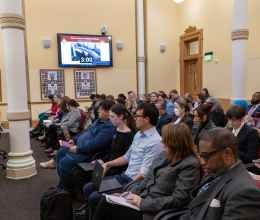
(Also posted on the Huffington Post at: http://www.huffingtonpost.com/nathan-woodliffstanley-/michael-marshalls-death-a_b_8940498.html)
Michael Marshall died last November at the Denver jail from injuries he received under the custody of Denver Sheriff deputies. Earlier today, his death was ruled a homicide by the City coroner's office. In addition to serious questions about use of force and why another unarmed person of color has died at the hands of Denver law enforcement -- his case illustrates several systemic deficiencies of our criminal justice system, both in Denver and nationwide.
Jailing the Poor: It is worth asking why Mr. Marshall was in custody in the first place. Mr. Marshall was arrested on a nonviolent charge of trespassing, and he was held on a supposedly nominal $100 bond. A bond that low indicates that he was not considered a risk to the community if released. Many people would easily bail out for that amount, but for those who are living in extreme poverty, it might as well be a million dollar bond. Clearly, Mr. Marshall could not afford to post bond, and that lack of access to just $100 cost him his freedom and ultimately his life.
At any given time, the majority of people in our jails are not there because of conviction for a crime. They are being held in pre-trial detention, most often leading to a plea bargain for time served in order to be released. Most of them are poor. If nominal bonds are given to people deemed to be a low risk, why not release them on personal recognizance instead of setting a financial threshold that presents a barrier only to people without money?
Lack of Mental Health Support: Marshall suffered from a mental illness that may have played a role in his arrest and detention. Too many people with mental illnesses are funneled into our jails and prisons. There is still inadequate mental health care both in our communities and in the criminal justice system, and law enforcement officers are often inadequately trained in how to interact with people who have a mental illness.
Racial Disparities: Once again, a person of color has died from an encounter with law enforcement. Whether there is conscious racial bias or not, the fact remains that black men and other people of color are much more likely to be arrested, incarcerated and killed by police than whites, and the difference is not in proportion to underlying rates of criminal behavior.
Lack of Transparency and Accountability: Denver has thus far refused to publicly release video showing exactly how Michael Marshall was injured and died in custody. And the track record of law enforcement accountability for use of excessive or deadly force is abysmal, both in Denver and across this nation. Denver has paid millions in settlements, but it has been decades since the Denver District Attorney's office has indicted law enforcement personnel for excessive force or homicide.
Our jails and prisons continue to be filled not in proportion to who actually commits serious crimes, but disproportionately with people who are poor, people living with mental illness, and people of color, at great personal cost to those who are jailed and their families, and at great financial cost to all of us who pay for crowded prisons and jails. No country puts more people behind bars than the United States, and it isn't because we have the most criminal population in the world. Jail time is an over-used and often counter-productive tool in this nation and state, and it is time for reforms to end costly mass incarceration.
